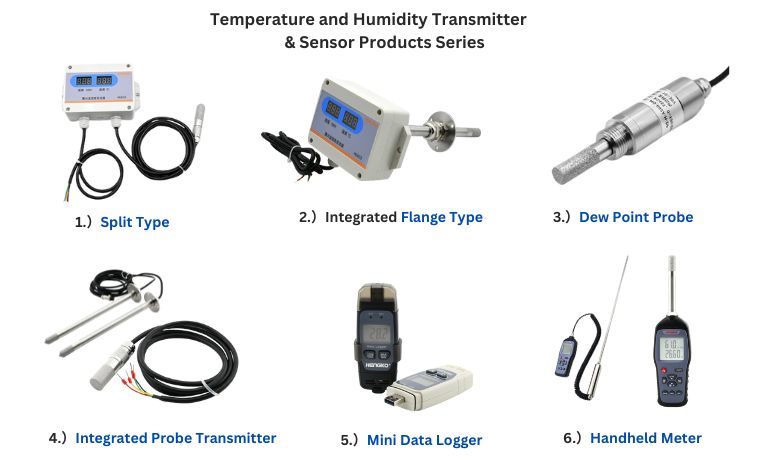-
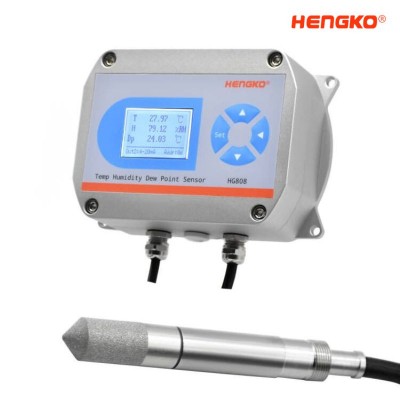
High Temperature Humidity Transmitter Around 190℃ RS485 Modbus 4-20mA Output
HG808 Super High Temperature Humidity Transmitter The HG808 is an industrial-grade temperature, humidity, and dew point transmitter designed for harsh enviro...
View Detail -
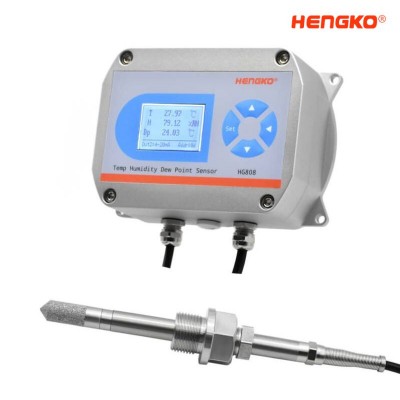
Over 190℃ High Temperature Humidity Transmitter with RS485 Modbus 4-20mA Output for Any...
HG808 Super High Temperature Humidity Transmitter The HG808 is an industrial-grade temperature, humidity, and dew point transmitter designed for harsh enviro...
View Detail -

High Temperature Humidity Transmitter with Modbus RS485 4-20mA Output for Special High ...
HG808 Super High Temperature Humidity Transmitter The HG808 is an industrial-grade temperature, humidity, and dew point transmitter designed for harsh enviro...
View Detail -
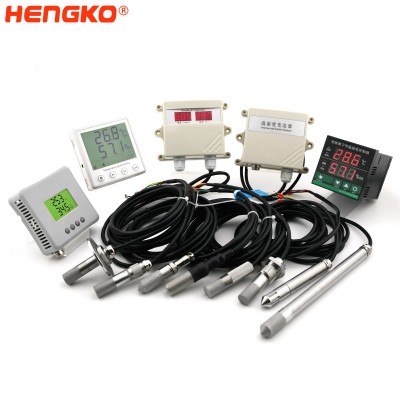
Humidity and Temperature Sensor Environmental and Industrial Measurement for Rubber Mec...
With the development of the economy, cars are becoming very popular in our life. Tires as automobile consumables, in our life, is also ver...
View Detail -
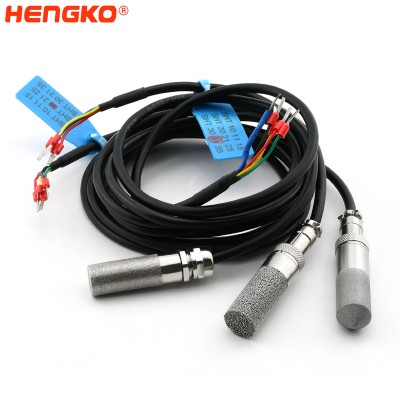
HENGKO IP67 waterproof exchangeable relative humidity and temperature sensor probe with...
HENGKO humidity sensor probe adopts high precision RHT-H serious sensor is a cable type sensor in the digital temperature and humidity sensor series. The sen...
View Detail -
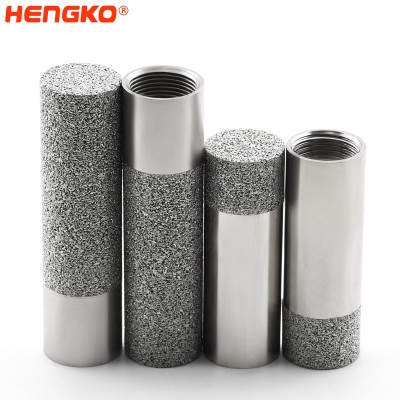
customized long-term stability sintered porous metal stainless steel sensor housing for...
HENGKO stainless steel sensor shells are made by sintering 316L powder material at high temperatures. They have been widely used in environmental protection,...
View Detail -
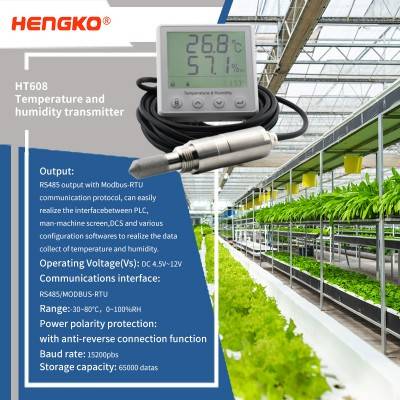
Smart agriculture for IOT Applications – Temperature and Humidity Sensor Monitoring
Sensors are widely used in agricultural production, and they can penetrate into every aspect of agricultural production. The use of temperature...
View Detail -
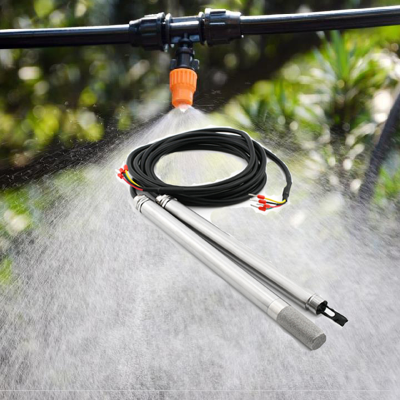
HENGKO® Temperature, Humidity, and Dew Point Sensor with ±1.5%RH accuracy for demanding...
The HENGKO® Miniature-size Humidity Transmitter HT606 is a trouble-free and cost-effective humidity transmitter with high accuracy and good stability. The po...
View Detail -
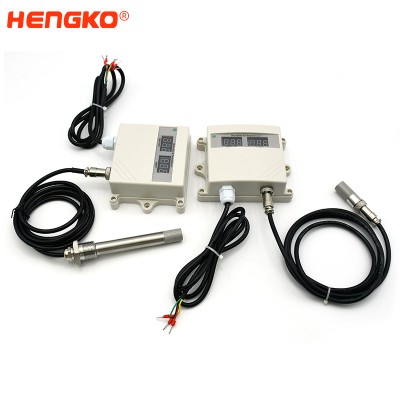
4-20mA Temperature and humidity sensor with PLC Realize Temperature control
Achieve Optimal Injection Molding Results with our Advanced Dehumidification System! In injection molding operations, achieving low mold coolant temperatures...
View Detail -
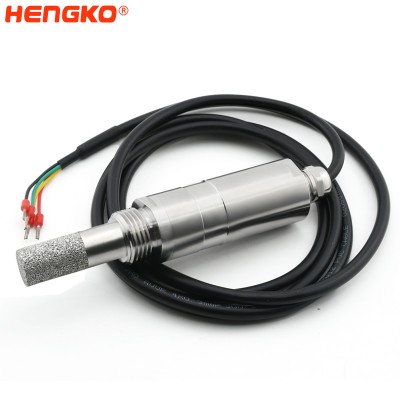
HG-602 Dew Point Sensor Transmitter for Industrial Drying Processes
With its compact design and durable stainless steel housing, the HG-602 industrial dew point transmitter provides accurate and reliable measurement data. It...
View Detail -
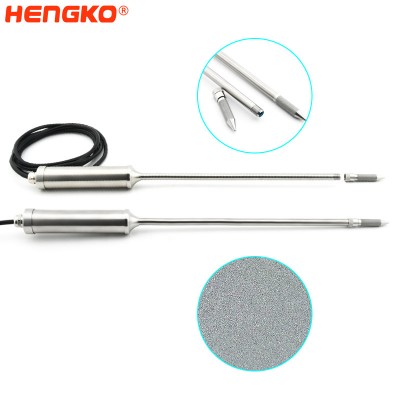
7.5″ Short, Narrow Relative Humidity Sensor Dew Point Sensor
IDEAL FOR MEASURING IN SMALL CREVICES AND IN BETWEEN TILES The HT-608c 7.5" (250mm) Short Narrow Wand Relative Humidity Probe has an 8mm diameter and is idea...
View Detail -
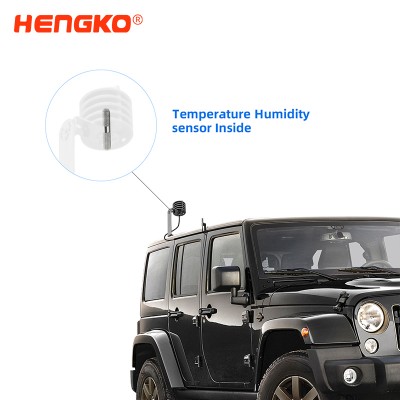
Combined humidity sensor probe to monitor a large area environmental
Case I.Combined with our humidity sensor probe turned into a mobile environmental sensor designed to monitor a large area. Installed on vehicles (forestry t...
View Detail -
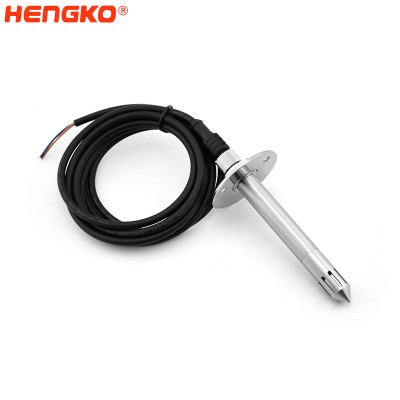
Humidity Sensor Probe, SS HT-E067 Accurate Humidity Sensor
Humidity Sensor Probe, IP65 Waterproof HT-E067 Features: • Standard Probe for rough environment • Measures relative humidity, temperature • Advanced probe ...
View Detail -
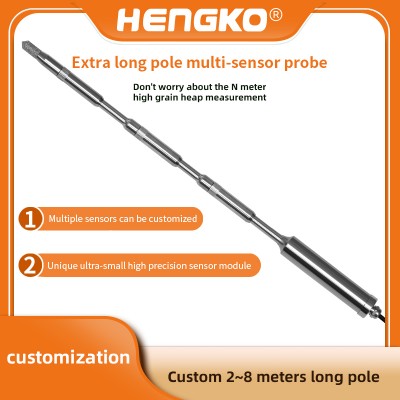
HENGKO® Multi Layer I2C Humidity Sensor
Introducing the HT-301: Your All-in-One Temperature and Humidity Measurement Solution Are you tired of using multiple sets of temperature and humidity...
View Detail -
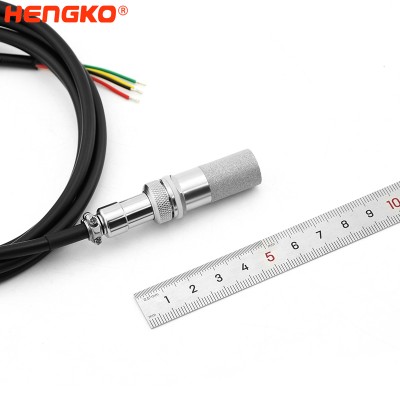
Temperature and Humidity Sensor Probe For Cold Chain Monitoring ± 0.1 ℃
±0.1℃ development of high precision, high stability temperature and humidity probe for cold chain monitoring. Foreign imports of moisture-sensitive temperatu...
View Detail -
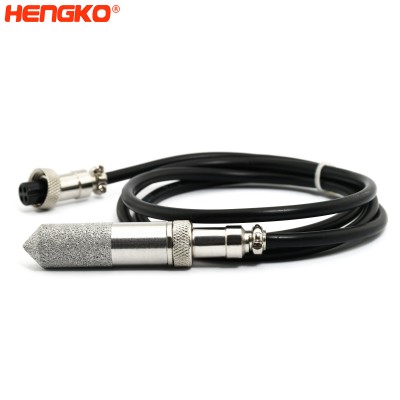
HT-P101 i2c best humidity sensor
HENGKO HT-P101 temperature and relative humidity sensor probe with 4-pin connect waterproof temperature and humidity sensor filter housing, high precision RH...
View Detail -

HT-P103 ±1.5% high precision humidity sensor
HT-P103 The HT-P103 humidity probe utilizes a high-tech thin-film polymer capacitance (RHT-H) sensor. This sensor enables rapid response and high accuracy hu...
View Detail -
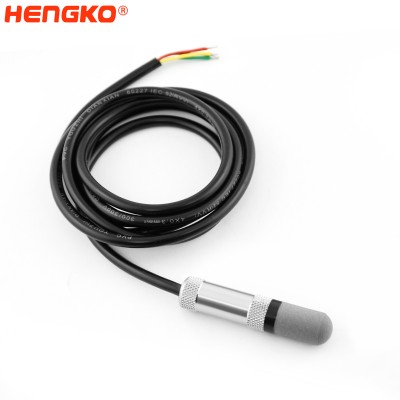
RS485 Modbus Air Temperature and Humidity Sensor HT-609
The HT-609 is a RS-485 remote temperature and humidity sensor that gives you real time temperature and humidity measurement data at the same time. It contain...
View Detail -
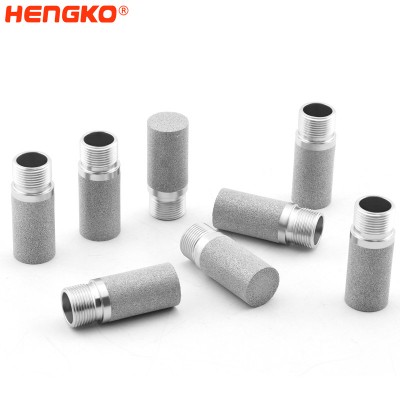
Rugged Industrial RS-485 MODBUS RTU Temperature and Humidity Sensor Housing – Sta...
Sensors with stainless steel humidity sensor housing are especially suited to use in aggressive ambient conditions. This type of steel is stainless, meaning ...
View Detail -
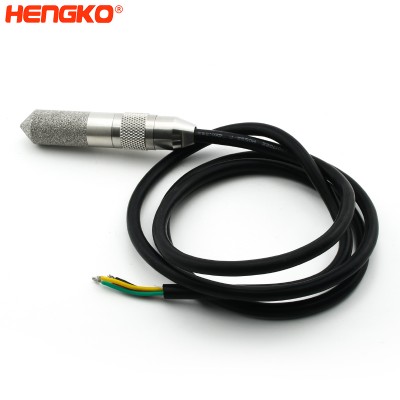
HT-P104 temperature and humidity sensor probe with knurled nut
An excellent ±2% relative humidity and ±0.5°C accuracy for most use. A cable type sensor in the digital temperature and humidity sensor series. Using the wor...
View Detail
Why You Should Choose Industrial Temperature And Humidity Sensor
Here are some possible sentences for a blog post on why one should choose industrial temperature and humidity sensors:
1.) Industrial temperature and humidity sensors are essential tools for maintaining optimal conditions in various industrial settings, from agriculture to manufacturing and beyond.
2.) With industrial temperature and humidity sensors, you can improve productivity and safety by ensuring that environmental conditions are within the ideal range for your specific needs.
3.) These sensors offer highly accurate and reliable data, making it easier for you to identify potential issues and adjust as needed to ensure maximum efficiency.
4.) Industrial temperature and humidity sensors are highly customizable, allowing you to tailor them to your specific requirements, including size, material, and sensor type.
5.) With their durable construction and resistance to harsh environmental conditions, these sensors are built to withstand tough industrial environments and provide long-lasting service.
6.) Choosing an industrial temperature and humidity sensor from a trusted manufacturer like HENGKO can ensure that you have a reliable and effective tool for monitoring and controlling environmental conditions in your specific industry.
Main Feature of Industrial Temperature and Humidity Sensor
1. Highly Accurate Data:
An industrial temperature and humidity sensor provides precise and reliable measurements of temperature and humidity, ensuring that environments are within the ideal range for optimal performance and safety.
2. Durable Construction:
These sensors are built to withstand harsh industrial conditions, from extreme temperatures to dust, moisture, and other contaminants, ensuring that they provide long-lasting service for your specific needs.
3. Customization Options:
These sensors offer a wide range of customization options, including different sizes, materials, and sensor types, allowing them to be tailored to fit the specific requirements of your application.
4. Real-time Monitoring:
With real-time monitoring capabilities, industrial temperature and humidity sensors provide instant feedback, allowing you to quickly adjust environmental conditions as needed to maintain ideal performance levels and safety.
5. User-friendly Interfaces:
These sensors are designed with simple controls and user-friendly interfaces, making them easy to install, operate, and maintain.
6. Versatility:
Industrial temperature and humidity sensors can be used in various industries, including agriculture, manufacturing, healthcare, and many more, providing reliable solutions for monitoring and controlling environmental conditions in specific applications.
7. Remote Access:
Some sensors offer remote access capabilities, allowing you to monitor and control environmental conditions from a remote location, providing extra convenience and flexibility.
8. Compliance with Standards:
These sensors meet or exceed industry standards, ensuring that they are safe and effective for your specific application needs.
By using industrial temperature and humidity sensors with these features, you can ensure that you have a reliable and effective solution for monitoring and controlling environmental conditions in your specific industry.
Application of industrial temperature and humidity sensors
1. Agriculture:
Industrial temperature and humidity sensors can help monitor and adjust environmental conditions in greenhouses, crop storage, and other agriculture-related applications, helping to ensure maximum crop yield and quality.
2. Manufacturing:
These sensors can be used in manufacturing applications to monitor temperature and humidity levels in production areas, helping to reduce waste and improve product quality.
3. Healthcare:
Industrial temperature and humidity sensors can be used in medical equipment and storage applications to monitor and control temperature and humidity levels, ensuring the safe and effective storage of medicines, vaccines, and other healthcare products.
4. Food Industry:
Industrial temperature and humidity sensors can help monitor and control environmental conditions in food processing and storage facilities, preventing spoilage and maintaining optimal conditions for food safety.
5. Data Centers:
These sensors can be used to monitor temperature and humidity levels in data centers, helping to prevent equipment failures caused by overheating or excess humidity.
6. HVAC:
Industrial temperature and humidity sensors can help regulate heating, ventilation, and air conditioning (HVAC) systems, ensuring optimal environmental conditions for comfort and energy efficiency.
7. Green Energy:
These sensors can be applied in renewable energy applications, such as solar panels, wind turbines, and energy storage systems, to monitor environmental conditions and help maximize energy efficiency and output.
8. Pharmaceuticals:
Industrial temperature and humidity sensors can help maintain ideal conditions in pharmaceutical storage facilities, ensuring the safety and efficacy of drugs and medical equipment.
By using industrial temperature and humidity sensors in these applications, you can help increase productivity, reduce waste, and ensure safety and compliance in your specific industry or environment.
FAQ for Industrial Temperature and Humidity Sensor
1. What is an Industrial Temperature and Humidity Sensor?
An industrial temperature and humidity sensor is an electronic instrument designed to measure and monitor temperature and humidity levels in industrial settings. These sensors provide reliable data that helps ensure optimal environmental conditions for safety and productivity.
2. How Do Industrial Temperature and Humidity Sensors Work?
These sensors work by using various sensing elements such as thermistors, RTDs (Resistive Temperature Detectors), or capacitive sensors to measure temperature and humidity levels. They then send this data to a microcontroller, which processes it and provides output signals for display or control functions.
3. What Are the Benefits of Using Industrial Temperature and Humidity Sensors?
The benefits of using these sensors include improved safety and productivity, reduced waste, and ensured compliance with industry and regulatory standards. These sensors provide precise and reliable data that helps identify potential issues and maintain optimal environmental conditions for specific applications.
4. What Industries Use industrial Temperature and Humidity Sensors?
Industries that commonly use these sensors include agriculture, manufacturing, healthcare, food processing, data centers, and HVAC systems. These sensors provide reliable solutions for monitoring and controlling environmental conditions in these industries.
5. Can Industrial Temperature and Humidity Sensors be Customized?
Yes, these sensors can be customized to fit the specific requirements of your application. Customization options include various sizes, materials, and sensor types to ensure optimal performance in your specific environment.
6. What is the Lifespan of an Industrial Temperature and Humidity Sensor?
The lifespan of these sensors can vary depending on the specific model and environmental conditions. However, with proper installation, maintenance, and calibration, these sensors can provide long-lasting service for your specific needs.
7. How Can I Select the Right Industrial Temperature and Humidity Sensor for My Application?
Selecting the right sensor for your application requires careful consideration of your specific requirements, including the size, accuracy, durability, and cost of the sensor. It's important to consult with a trusted manufacturer like HENGKO to ensure you select the right sensor for your needs.
8. What is the Difference Between Indoor and Outdoor Temperature and Humidity Sensors?
Indoor temperature and humidity sensors are designed for use in controlled environments, while outdoor sensors are built to withstand harsh outdoor conditions. Outdoor sensors are typically more durable and resistant to extreme weather conditions.
9. Can Temperature and Humidity Sensors be used for Monitoring Air Quality?
While temperature and humidity sensors are not specifically designed for monitoring air quality, they can provide valuable data on factors that affect air quality, such as temperature, humidity, and carbon dioxide levels.
10. What is the Maximum Temperature Range for Industrial Temperature Sensors?
The maximum temperature range can vary depending on the specific model and application requirements. However, some industrial temperature sensors can measure temperatures up to 1000°C or more.
11. What is the Difference Between Thermocouples and RTDs?
Thermocouples are temperature sensors that measure temperature by using the voltage generated between two dissimilar metals. RTDs measure temperature by detecting changes in the resistance of a metal wire as its temperature changes.
12. What Are Some Common Humidity Sensor Technologies?
Humidity sensors use a variety of technologies to measure humidity levels, including capacitive, resistive, and thermal conductivity sensors.
13. Can Industrial Temperature and Humidity Sensors be Used for Remote Monitoring?
Yes, some temperature and humidity sensors can be used for remote monitoring. These sensors typically have wireless capabilities and can transmit data to a remote system for analysis and control.
14. How Do I Calibrate an Industrial Temperature and Humidity Sensor?
Calibration involves verifying the accuracy of the sensor and adjusting it accordingly. Calibration should be performed regularly to ensure that the sensor provides reliable and accurate data.
15. What is the Operating Temperature Range of Industrial Humidity Sensors?
The operating temperature range can vary depending on the specific model and application requirements. However, some industrial humidity sensors can operate in temperatures ranging from -40°C to 85°C.
16. How Do Industrial Temperature and Humidity Sensors Help Improve Energy Efficiency?
These sensors provide data that can be used to optimize HVAC systems and other equipment for energy efficiency. By maintaining optimal environmental conditions, energy consumption can be reduced, resulting in cost savings.
17. What Are the Environmental Benefits of Using Industrial Temperature and Humidity Sensors?
The environmental benefits of using these sensors include reduced energy consumption, minimized waste, and increased efficiency, which ultimately leads to a lower carbon footprint and a more sustainable industrial operation.
Contact HENGKO today to discover how our industrial temperature and humidity sensors can help
optimize your productivity, safety and energy efficiency while reducing waste and environmental impact.
Let us help you find the perfect solution for your specific application needs. Email us at ka@hengko.com
to request a quote or schedule a consultation with our team.
